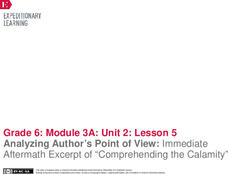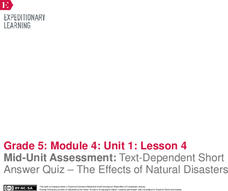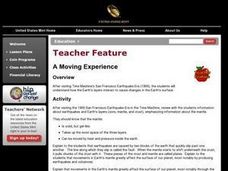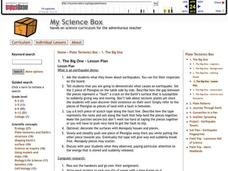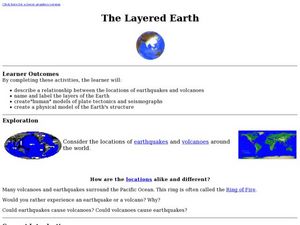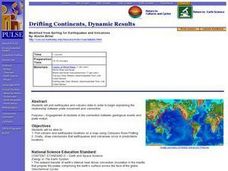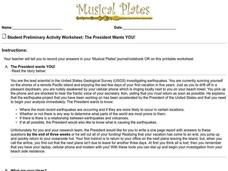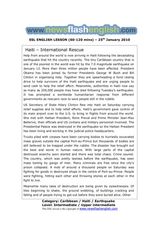Curated OER
Tetonic Plates and Faults
Students understand the basic properties of plate motion. They demonstrate what happens to a plate while faulting while using manipulatives. They demonstrate the Nature of Scientific Inquiry to solve scientific issues.
Curated OER
Extreme Weather
Students examine different types of extreme weather and how to prepare for them. In this weather lesson students explore different types of extreme weather and create disaster preparation posters for different types of extreme weather.
Curated OER
Modeling Natural Disaster with Mathematical Functions
Ninth graders investigate the functional relationship of different environmental phenomena. In this math lesson, 9th graders create models of various natural disasters. They use logarithmic and exponential functions to interpret...
Curated OER
Myths and Legends on Natural Disasters: Making Sense of Our World
Students explore different natural and manmade disasters through a webquest. In this earth science activity, students explain their causes. They also discuss how disasters affect society.
Curated OER
Earthquake Unit
Eighth graders watch the "Earth, the Environment & Beyond" video on earthquakes. Take notes and give an oral summary. They build a working, two dimensional model of a strike-slip, thrust, or normal fault.
Curated OER
Hazards: Fifth Grade Lesson Plans and Activities
After comparing earthquake and volcanic hazards to one another, fifth graders take a closer look at damage associated with a volcanic eruption. They then create a simulation of mudslides due to a volcanic eruption. Using different...
Curated OER
Hazards: Sixth Grade Lesson Plans and Activities
Sixth graders explore the damage associated with an earthquake by designing a structure that can withstand earthquake intensities on a shaker board. They then view tips for preparing for an earthquake, and what...
Curated OER
Plate Tectonics: Sixth Grade Lesson Plans and Activities
Here is a set of pre-lab, lab, and post-lab lesson plans on plate tectonics. After completing the previous labs on volcanoes and earthquakes, sixth graders use the gained knowledge to explore plate boundaries and the movement of...
Curated OER
Plate Tectonics: Second Grade Lesson Plans and Activities
Second graders explore convection currents and how they relate to the movement of tectonic plates. Then, young geologists reconstruct Pangaea with a worksheet and pinpoint plate boundaries on a map...
Curated OER
Only the Facts
Practice the strategy of summarizing to gain meaning and knowledge from an informational text. Young readers highlight supporting details and main ideas, and then they use this to summarize two articles: "The Great Quake" and "What...
Pulitzer Center
"Voices from Haiti": Using Poetry to Speak up for a Cause
Explore a real world use of poetry with your class! Young language arts pupils consider the concept of advocacy and how journalism, photography, and poetry can raise awareness for a cause. They read several poems about individuals...
EngageNY
Analyzing Author’s Point of View: Immediate Aftermath Excerpt of “Comprehending the Calamity"
Analyze that! Scholars continue reading and analyzing a primary source about the immediate aftermath of the 1906 San Francisco fire and earthquake. Then, individuals use graphic organizers to identify the author's point of view.
Curated OER
Agents of Erosion
Fourth graders observe and identify the effects of geological activities and weathering on Earth's surface. They also take a look at reports of events such as storms, earthquakes, floods, and volcanoes. There is a hefty hands-on activity...
NOAA
Waves
Is it possible to outrun a tsunami? After watching a presentation that explains how waves and tsunamis occur, class members investigate the speed of tsunamis triggered by an earthquake.
EngageNY
Mid-Unit Assessment: Text-Dependent Short-Answer Quiz—The Effects of Natural Disasters
Readers complete a mid-unit assessment by reading the text How Do Hurricanes Form? They answer text-dependent questions about hurricanes with short answer and sequencing. Learners then participate in a read aloud and text chunking...
Curated OER
Shake, Rattle and Erupt
Learners study myths regarding four earthquakes myths. They receive a list of supplies each family should have at home to prepare for an earthquake and construct an "Earthquake Preparation" poster showing some of the most important items...
Curated OER
A Moving Experience
Pupils visit Time Machine's San Francisco Earthquake Era. They understand how the Earth's layers interact to cause changes in the Earth's surface. They review information about earthquakes and Earth's layers.
Curated OER
The BIG One
Students observe an earthquake demonstration. They research an earthquake and use color dots to plot the location of each of their earthquakes on the large map.
Curated OER
The Layered Earth
Students role play plate tectonics by creating a "plate statue" made up of students. In this earth science lesson, students describe how Earth's movement cause earthquakes and volcanoes. They draw and name the different layers of the Earth.
Curated OER
Drifting Continents, Dynamic Results
Students plot earthquake and volcano data using a Compass Rose Plotting. They explain the relationship between plate movement and connection. They draw conclusions that earthquakes and volcanoes occur in predictable locations.
Curated OER
The President Wants YOU!
In this earthquakes worksheet, students answer short answer questions about earthquakes to provide information to the President. Students complete 8 questions.
Curated OER
Haiti – International Rescue
Ninth graders examine the problems that exist in Haiti after the earthquake. For this disaster recovery lesson, 9th graders read an article and answer guided questions. Students create a presentation about the international rescue in...
Curated OER
Plate Tectonics
Young scholars simulate the three types of plate boundaries using robots. In this earth science activity, students explain how earthquakes and volcanoes are formed. They collect real-world earthquake data and plot them on the map.
Other popular searches
- Volcanoes and Earthquakes
- San Francisco Earthquake
- Earthquake Proof Buildings
- Indian Ocean Earthquake
- Earthquakes and Epicenter
- Web Quest Earthquakes
- Plotting Earthquakes
- Earthquake Lab
- Earthquake Vocabulary
- Volcanoes Earthquakes
- Earthquake Safety
- Earthquakes Epicenters













